|
|
|
Sort Order |
|
|
|
Items / Page
|
|
|
|
|
|
|
| Srl | Item |
| 1 |
ID:
083486
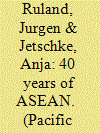

|
|
|
|
|
| Publication |
2008.
|
| Summary/Abstract |
In this introduction, the editors trace the increasing theoretical diversity of ASEAN research and discuss the contributions to this issue against the current state of the art. Contributions confirm the post-Asian crisis advancement of constructivist scholarship, but by also analyzing ASEAN from the Liberal and English school perspectives, the articles assembled in this issue nevertheless stand for theoretical pluralism. This article continues to open a governance perspective and, against this background, attests to ASEAN's marked success in pacifying an erstwhile turbulent world region but also to ASEAN's much more ambiguous record in responding to the new challenges associated with globalization
|
|
|
|
|
|
|
|
|
|
|
|
|
|
|
|
| 2 |
ID:
083489
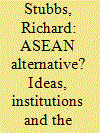

|
|
|
|
|
| Publication |
2008.
|
| Summary/Abstract |
Over the last 40 years ASEAN has developed a set of goals and norms with regard to the conduct of regional and international relations that provide an alternative paradigm to the dominant contemporary Western liberal approach to 'global' governance. ASEAN's alternative paradigm is rooted in Asia's cultures and the region's colonial and Cold War experiences. Using an historical institutionalist approach, the analysis details the paradigm's central features - the importance of neutrality; sovereignty and territorial integrity; the peaceful settlement of disputes; informal, non-confrontational negotiations; and the promotion of domestic stability and social harmony - which together underscore the importance of state autonomy and non-interference in the affairs of other states. The paradigm's influence in global affairs has increased markedly in recent years, most notably as the ASEAN-China linkage has matured and China has given its strong support to ASEAN's approach to the conduct of international relations. This turn of events suggests that the ASEAN paradigm presents a significant challenge to Western hopes for a common approach to 'global' governance.
|
|
|
|
|
|
|
|
|
|
|
|
|
|
|
|
| 3 |
ID:
083529
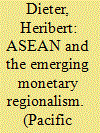

|
|
|
|
|
| Publication |
2008.
|
| Summary/Abstract |
Monetary regionalism - along with bilateral trade agreements - is receiving significant attention in Asia. This article analyzes its development since 2000 with specific reference to the role of ASEAN. It discusses the general rationale for monetary and financial cooperation, the Chiang Mai process, the rivalry between China and Japan, the potential exchange rate regime for the region including monitoring and surveillance, the evolution of regional bond markets, as well as the institutional dimension of monetary regionalism. The analysis confirms that monetary regionalism in Asia will be a complex endeavor and will - if at all - only be achieved in the long run. ASEAN will be able to function as a catalyst for monetary regionalism, but China and Japan are the more important players. Without their (joint) effort, ASEAN will not be able to achieve significant change in monetary and financial affairs.
|
|
|
|
|
|
|
|
|
|
|
|
|
|
|
|
| 4 |
ID:
083531
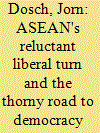

|
|
|
|
|
| Publication |
2008.
|
| Summary/Abstract |
New liberal spaces in several Southeast Asian countries have created a window of opportunity for non-state actors to lobby for the promotion of democracy and human rights in ASEAN. Democratically elected governments cannot ignore the voices of their constituencies and consequently promote liberal values at the regional level. This is mainly the case for Indonesia and the Philippines, and the other member states find it difficult to close their eyes to liberal agendas. Both Jakarta and Manila follow a foreign policy strategy of reforming ASEAN into an organization that actively subscribes to democratic values, as the process of negotiating the ASEAN Charter demonstrated. The charter gives evidence of the group's cautious liberal turn as it explicitly identifies the rule of law, good governance, democratic principles and constitutional government as essential elements of political order. However, it is a long way from the cautious acceptance of general democratic values to the active promotion and regional enforcements of rules based on these norms. In view of the diversity of political systems and ideologies within ASEAN, it comes as no surprise that the association as a collective actor is unable to agree on any meaningful strategy as to how to support and respond to political change. ASEAN's failure to use diplomatic leverage to pressure its member Burma for political reforms is a case in point. At the same time ASEAN does not impede democracy, and future analysts might be looking back on the commitment to core democratic values in the ASEAN Charter as the pre-stage of regional-democracy promotion.
|
|
|
|
|
|
|
|
|
|
|
|
|
|
|
|
| 5 |
ID:
083490
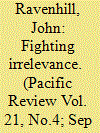

|
|
|
|
|
| Publication |
2008.
|
| Summary/Abstract |
Contrary to expectations at the time, the financial crises of 1997-98 may have strengthened ASEAN. The backlash against a perceived unsympathetic Western response put ASEAN at center stage in new regional cooperative arrangements. Moreover, the rivalry between China and Japan for regional leadership has led them both to seek to negotiate regional partnerships with ASEAN as a whole. ASEAN, however, faces new challenges - particularly from rapid economic growth in China and India, and from the proliferation of preferential trade agreements (PTAs). ASEAN has made only slow progress in economic cooperation, which has fallen further behind schedule. The private sector makes little use of ASEAN's preferential arrangements because they afford little advantage over most-favored-nation tariffs. ASEAN has failed to address 'deeper integration' issues - the removal of 'beyond border' barriers to trade. Some of the bilateral PTAs that ASEAN countries have negotiated with extra-regional partners go further in removing barriers than ASEAN's own arrangements. ASEAN members continue to eschew binding commitments. Liberalization under ASEAN's auspices has not been sufficiently significant to encourage business groups to invest substantial resources in lobbying for deeper integration
|
|
|
|
|
|
|
|
|
|
|
|
|
|
|
|
| 6 |
ID:
083487
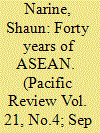

|
|
|
|
|
| Publication |
2008.
|
| Summary/Abstract |
This paper assesses the historical development of the Association of Southeast Asian Nations (ASEAN). During its 40 year history, ASEAN has achieved limited success in influencing the normative environment of Southeast Asia. ASEAN has helped shape institutional development in the Asia Pacific, particularly since the 1990s. It remains at the center of Asia Pacific regionalism. However, ASEAN's diverse membership and its need to maintain the fundamental principle of non-intervention limit its ability to reform. ASEAN's future is closely tied to its role in facilitating the emergence of China as a global power
|
|
|
|
|
|
|
|
|
|
|
|
|
|
|
|
| 7 |
ID:
083530


|
|
|
|
|
| Publication |
2008.
|
| Summary/Abstract |
The transnational security challenges posed by non-traditional security (NTS) issues like pandemics are pushing ASEAN to deepen regional security cooperation. However, unless regional efforts at addressing complex NTS threats like pandemics are reinforced by a more holistic, human security approach, many of the current initiatives will remain inadequate
|
|
|
|
|
|
|
|
|
|
|
|
|
|
|
|
| 8 |
ID:
083488


|
|
|
|
|
| Publication |
2008.
|
| Summary/Abstract |
This article attempts to build on insights on scholarship that tries to explain the successfulness of ASEAN and tries to produce some tested conclusions on what it is that explains ASEAN's success best. This is done by using slightly stricter criteria of explanation that has been used before and by exploiting the newest quantitative data on conflicts. Stricter explanation is attempted through greater care in defining the variables of explanation, as well as by trying to avoid the Western biases that many of the existing international relations theories have. When explaining how ASEAN manages to reach many of its political objectives, the focus in this article is on material realties as well as perceived and constructed ones. The explanation attempts to be careful in assessing what is to be explained. This is why this article first defines the criteria of success by looking at what it is that ASEAN attempts to do and then employs the quantitative data to see whether the existence of ASEAN is correlated to the desired outcomes. At the end of this article, the concluding explanation of ASEAN will be relativized by looking at the new challenges to which ASEAN should or could respond. The elitism of the 'old ASEAN Way' will need to give way to a more broad-based approach to stability, if ASEAN wants to remain relevant as an organization in the future.
|
|
|
|
|
|
|
|
|
|
|
|
|
|
|
|
|
|
|
|
|